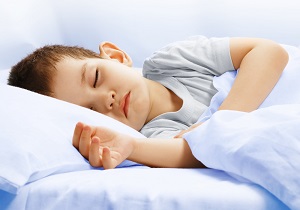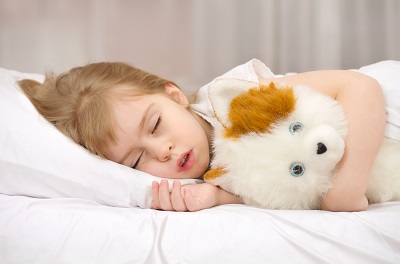 Separation anxiety can have a huge impact on your child’s ability to sleep well at the various stages, when it will typically peak within the first few years of life. The first time it may emerge is at some point within the second part of the first year; around six to 10 months or thereabouts. This can typically coincide with a mother's return to work and a transition to day care, which can often heighten this developmental stage. It is very normal for parents to experience a significant amount of sleep disturbances from an otherwise established sleeper during this developmental stage, represented by frequent night awakenings, requiring reassurance and short napping throughout the day.
Separation anxiety can have a huge impact on your child’s ability to sleep well at the various stages, when it will typically peak within the first few years of life. The first time it may emerge is at some point within the second part of the first year; around six to 10 months or thereabouts. This can typically coincide with a mother's return to work and a transition to day care, which can often heighten this developmental stage. It is very normal for parents to experience a significant amount of sleep disturbances from an otherwise established sleeper during this developmental stage, represented by frequent night awakenings, requiring reassurance and short napping throughout the day.
Within the first six months, an infant has no “object permanence”; meaning that when something is there they are aware, but as soon as it is removed then they don’t remember, which is why a lot of young children can be passed around through different adults without objection and take such enjoyment from games like “peek-a-boo”. However, a typically developing child will start to potentially have increasing anxiety as their social awareness develops and before their memory has caught up, around six to 10 months, which can lead to them “making strange”. It is a great sign that your child is reaching their developmental milestones; in this case, developing a greater sense of individuation from you, but as with all aspects of parenting, it comes with its own challenges. However, there are lots of strategies for you to help your child manage this stage throughout the early years.
Your infant and separation anxiety and sleep
You may start to notice that your baby clings to you and cries when you either try to leave the room or when you try to leave him/her with a childminder, for example.
It can emerge from nowhere - one day your child is fine; the next, not so.
Separation anxiety at this age can lead to a poor napping schedule and numerous night time awakenings. Sleep is probably the biggest separation, and a child in the throes of separation anxiety will not want to be left alone.
Your toddler and separation anxiety and sleep
Separation anxiety will typically come and go throughout the toddler years, most often observed around 18 months and again at two years, and in each instance potentially compounding a sleep regression stage.
At this time, sleep can again fall apart around nap and bedtimes and over-night, manifesting as full-on temper tantrums and resistance to sleep.
Parents should be responsive and loving with their children during these times, but also mindful to avoid creating poor sleeping associations that may remain long after the separation anxiety has passed.

Solutions for separation anxiety and sleep disturbances
1. Increase daytime attention, focusing on spending sincere, one to one time with your child that involves plenty of physical and eye contact and to help your child feel “connected “ to you. Experts recommend that 20 minutes of one to one, face to face time, exclusive with your child, allowing floor time, led by your child, without distractions such as phones and computers, is a magic opportunity for attachment. During the first stages of separation anxiety a young child may also be discovering how to move away from you and you want to ensure that they feel safe to roam and that you remain a secure base for them.
2. Practise lots of peek a boo, jack in the box and covering items up with blankets for example, helping your child learn how things can disappear and reappear also, like when you go away.
3. Avoid ever sneaking away from your child. Although sometimes difficult to experience the upset, it is important that you always say good bye, so that you don’t heighten their fears and cause extra uncertainty, by slipping away when it is safe and you are unseen. Walk away with confidence and without fear and anxiety of your own to avoid them picking up on this. Practise going away and returning within your house for a while. Go down to your child’s level and tell them you are going to check/get something and quite quickly return, demonstrating that although you go away, you always return.
4. Avoid always picking your child up when they look to come into your arms…again, come down to their level and engage with them on the floor or play mat.
5. It can be worthwhile allowing on older child a small photo book of the family to keep with him, or even a post-it note with your kiss lip-sticked onto it for his pocket. I would often advise large pictures of mum and dad in the bedroom, next to the bed to help with their anxiety.
6. Consider introducing a transitional object such as a safe, breathable blanket for young children and perhaps a safe stuffed toy of choice for an older child.. a cute mummy bear or doll for him/her to look after and vise versa.
7. Lengthen your bedtime routine by as much as 15 minutes to factor in some extra time together. Allow for lots of bonus cuddles, hugs and holding to help with the transition to sleep time, when you will need to leave the room.
8. To help lessen anxiety at sleep time, you will need to over compensate during non sleep time. You may need to spend lots of waking time in their bedroom, to help bridge the gap between the separation that is sleep and to void room anxiety.
9. Overnight, consider the use of a dim night light, so that when your child briefly awakens overnight, they are not in the pitch black and not able to see that they are “ok” without having to call on you
10. Don’t mistake separation anxiety for over-tiredness or ongoing inappropriate sleep associations. Manifestations of separation anxiety will be present during the day time, when you are trying to leave for example, not just at bedtime and overnight.
11. Don’t start a sleep learning process if you believe that your child is experiencing separation anxiety. Allow the stage to pass and then consider an appropriate approach to helping your child learn how to sleep well.
Lucy Wolfe, CGSC, MAPSC, is a paediatric sleep consultant and mum of four young children. She runs a private sleep consulting practice where she provides knowledge, expertise and valuable support to families across the country. See www.sleepmatters.ie <http://www.sleepmatters.ie>, t: 087 2683584 or e: lucy@sleepmatters.ie








